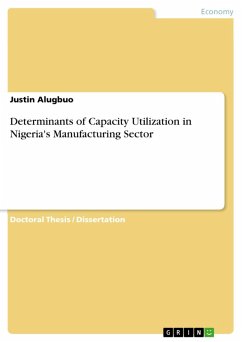
Alteration of Company Capital in Nigeria (eBook, PDF)

PAYBACK Punkte
0 °P sammeln!
Seminar paper from the year 2021 in the subject Business economics - Investment and Finance, grade: 4.0, University of Lagos, course: Company Law, language: English, abstract: Company Capital is, without a shadow of doubt, the lifeblood of a company. Whether viewed in the light of the subjective approach, (capital as residing in physical goods which can produce other goods and services), or objective approach (the monetary sum at the investors' disposal), one thing remains true. Without capital, companies cannot function. However, a company may alter its capital for different reasons, some of ...
Seminar paper from the year 2021 in the subject Business economics - Investment and Finance, grade: 4.0, University of Lagos, course: Company Law, language: English, abstract: Company Capital is, without a shadow of doubt, the lifeblood of a company. Whether viewed in the light of the subjective approach, (capital as residing in physical goods which can produce other goods and services), or objective approach (the monetary sum at the investors' disposal), one thing remains true. Without capital, companies cannot function. However, a company may alter its capital for different reasons, some of them include: to suit the needs of the investors, to write off the deficit and fund current liabilities, to maintain a balance between preference and equity shares, and balance out the financial plan, and even to meet legal requirements. In altering their capital, companies must abide by the hallowed provisions set out in the Companies and Allied Matters Act (CAMA) 2020. To this end, this paper gives a detailed explanation of the meaning, nature, and legal requirements for the alteration of company capital.
Dieser Download kann aus rechtlichen Gründen nur mit Rechnungsadresse in A, B, BG, CY, CZ, D, DK, EW, E, FIN, F, GR, HR, H, IRL, I, LT, L, LR, M, NL, PL, P, R, S, SLO, SK ausgeliefert werden.













